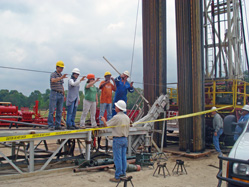
In 2009, the U.S. Department of Energy’s (DOE) National Energy Technology Laboratory (NETL) selected seven projects to help develop regional sequestration technology training centers in the United States. The “Southeast Regional CO2 Sequestration Technology Training Program” (SECARB-Ed) was managed and administered by the Southern States Energy Board (SSEB) from November 16, 2009, to November 15, 2012. During this performance period the efforts of SECARB-Ed and partners resulted in a total of 1,951 professional development hours (PDHs) awarded to 1,131 participants.
In a second initiative, SSEB proposed continuing its in-house elements of the SECARB-Ed program under the DOE’s Office of Clean Coal and its Office of Clean Energy Collaboration.
The SECARB-ed program will enhance and support tasks 2.1, 2.3 and 2.4 of the Regional Effort to Promote the Increased Use of U.S. Clean Coal and Energy Technologies Collaboration and Transfer:
- 2.1 Assist DOE’s Office of Clean Coal and its Office of Clean Energy Collaboration by enhancing the awareness of state and regional policy-makers and their advisors regarding funding sources for major coal investment projects, including financial institutions that will consider investments; policy issues and risk profiles for emerging technologies; and the attraction of a stable investment environment.
- 2.3 Provide state law makers and regulators with the technical background to support future clean energy demonstration programs and their commercial deployment.
- 2.4 Promote workforce education and training to ensure a stable, educated, technology-oriented and professional labor force for the future of the mining industry.
Goals/Objectives
The goal of this project is to advance the United States in its position as the leader in CCS technologies by addressing climate change and developing near-zero emission technologies that will significantly reduce CO2 emissions from industrial plants.

The project objective is to transfer the knowledge required to enable commercial professionals to implement and deploy CCS projects in the United States. The training is designed for site developers, geologists, engineers, scientists, and technicians but will be available to others as well. Specific CCS project areas to be addressed are site development, operations, and the monitoring of commercial CCS projects. Knowledge and technology transfer will take place through the creation of CCS technology curriculum and a regional transfer platform.
